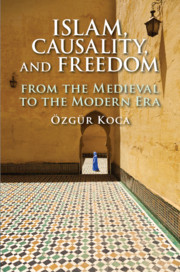Book contents
- Islam, Causality, and Freedom
- Islam, Causality, and Freedom
- Copyright page
- Dedication
- Contents
- Conventions
- Acknowledgments
- Introduction
- 1 Causality in the Early Period
- 2 Toward a Synthesis of Aristotelian and Neoplatonic Understandings of Causality
- 3 Occasionalism in the Middle Period
- 4 The First as Pure Act and Causality
- 5 Light, Existence, and Causality
- 6 The World as a Theophany and Causality
- 7 Continuities and Developments in Sufi Metaphysics
- 8 Toward an Occasionalist Philosophy of Science
- 9 Causality and Freedom in Later Islamic Philosophy
- 10 Occasionalism in the Modern Context
- 11 Islamic Theories of Causality in the Modern Context
- Conclusion
- Bibliography
- Index
8 - Toward an Occasionalist Philosophy of Science
The Case of Jurjānī
Published online by Cambridge University Press: 14 May 2020
- Islam, Causality, and Freedom
- Islam, Causality, and Freedom
- Copyright page
- Dedication
- Contents
- Conventions
- Acknowledgments
- Introduction
- 1 Causality in the Early Period
- 2 Toward a Synthesis of Aristotelian and Neoplatonic Understandings of Causality
- 3 Occasionalism in the Middle Period
- 4 The First as Pure Act and Causality
- 5 Light, Existence, and Causality
- 6 The World as a Theophany and Causality
- 7 Continuities and Developments in Sufi Metaphysics
- 8 Toward an Occasionalist Philosophy of Science
- 9 Causality and Freedom in Later Islamic Philosophy
- 10 Occasionalism in the Modern Context
- 11 Islamic Theories of Causality in the Modern Context
- Conclusion
- Bibliography
- Index
Summary
The eighth chapter focuses on the thought of Jurjānī to understand later developments in the occasionalist tradition. Jurjānī was one of the most important Ashʿarite theologians who transformed occasionalism from a theory of causality into the central axis of all theological thinking. The notion of possibility made central by Ashʿarite occasionalism became the modus operandi for thinking about questions from prophetology and eschatology to theodicy and free will. More importantly, Jurjānī develops a critical philosophy of science to appropriate and criticize Aristotelian-Ptolemaic-Avicennian natural philosophy/sciences. An examination of this attempt reveals the complex relationship of Ashʿarite occasionalism with medieval natural philosophy and sciences.
- Type
- Chapter
- Information
- Islam, Causality, and FreedomFrom the Medieval to the Modern Era, pp. 159 - 182Publisher: Cambridge University PressPrint publication year: 2020

